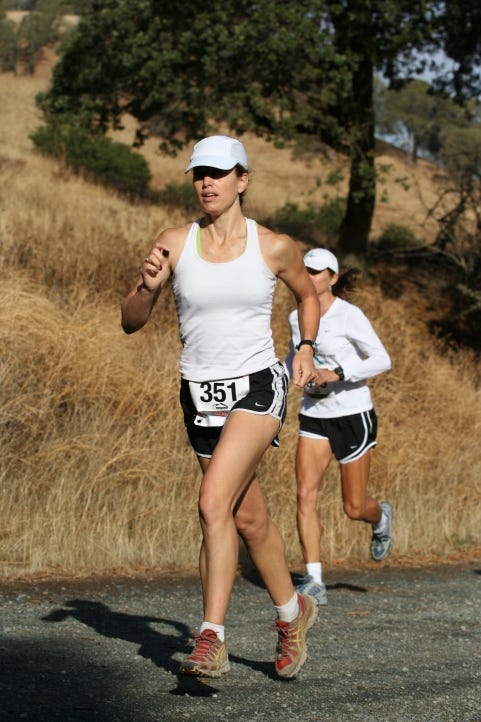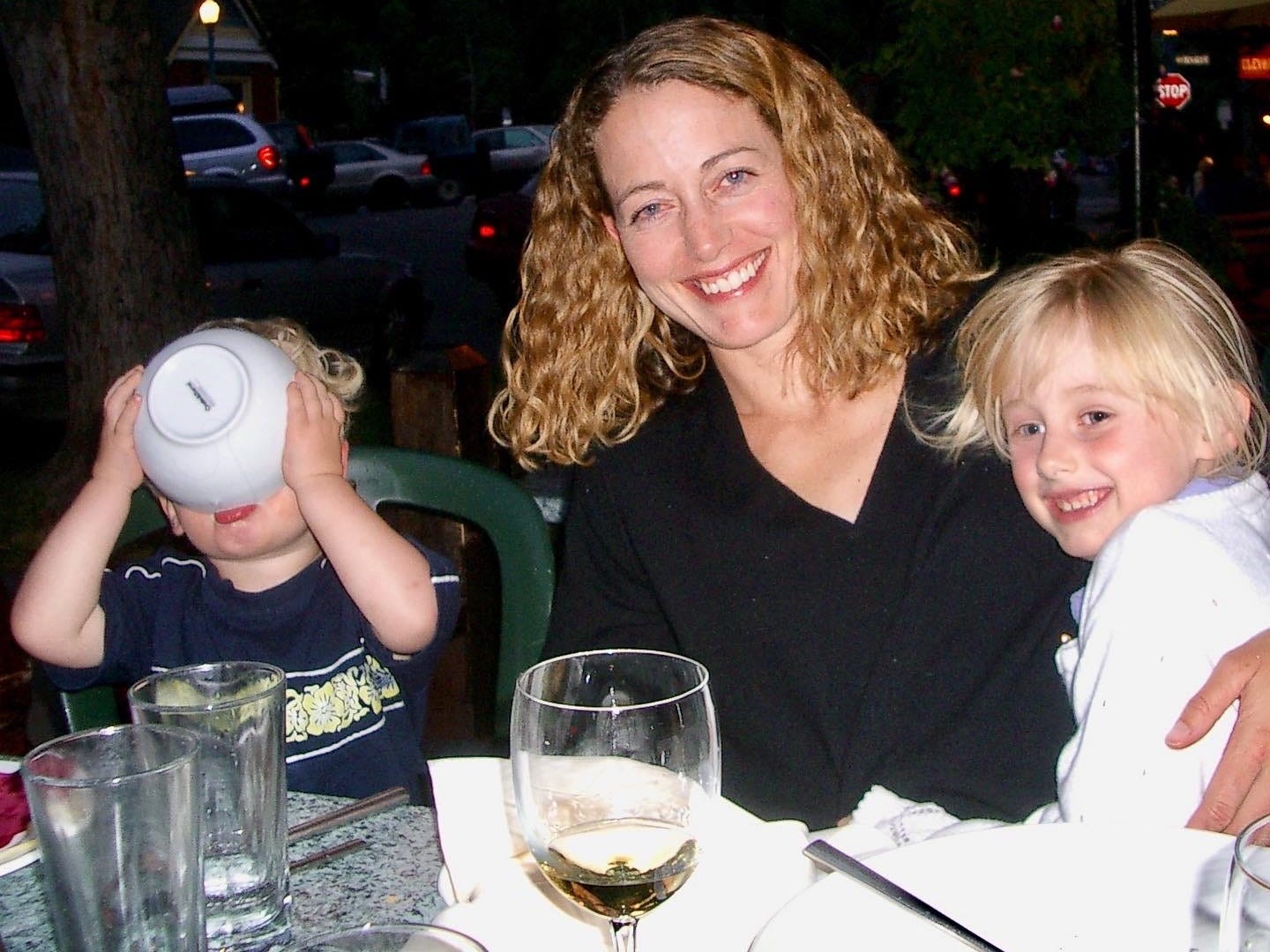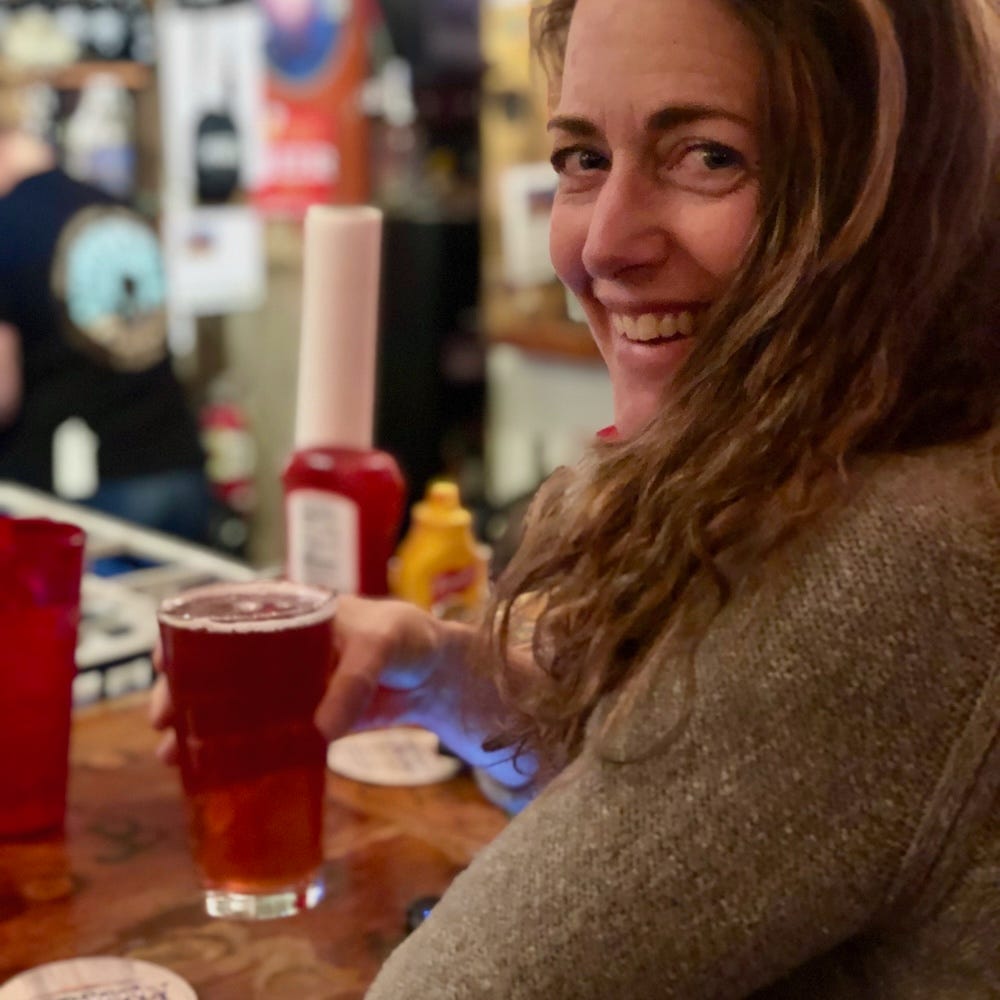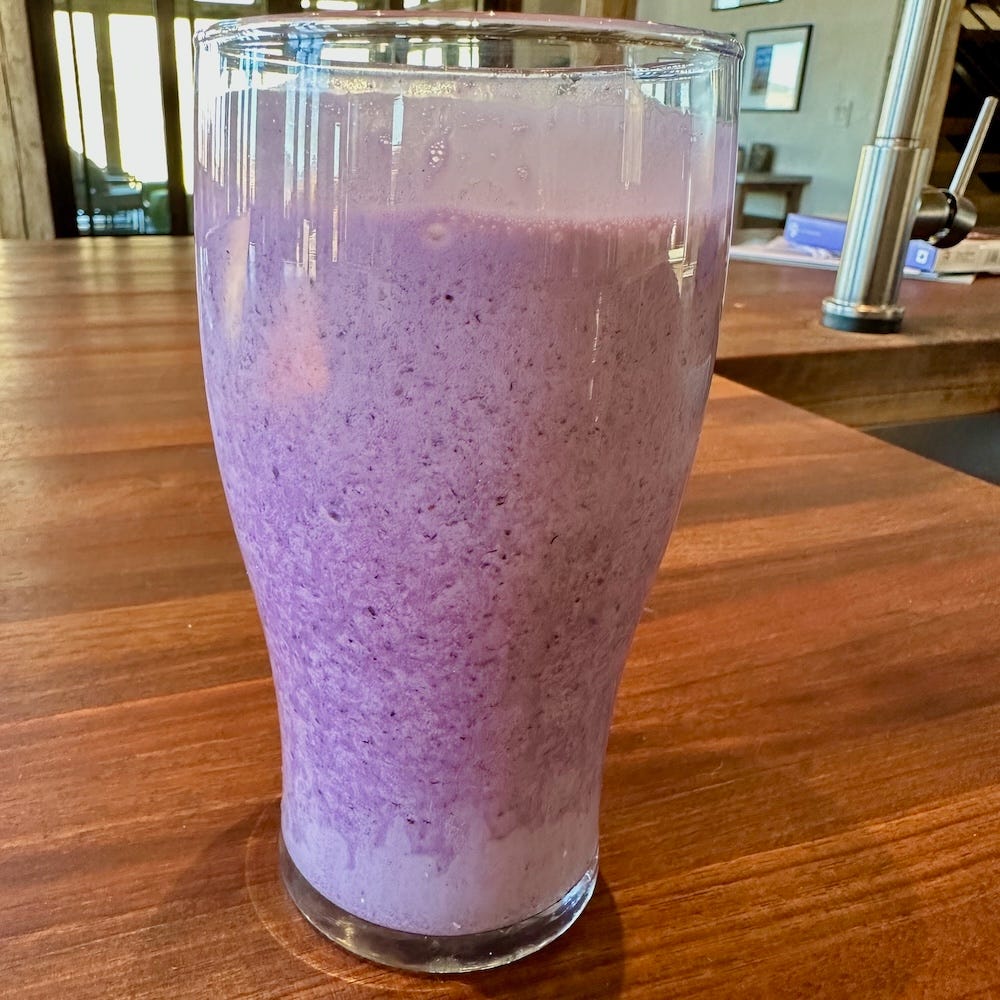A Drinking and Running Story
If you struggle with moderation, I see you
Normally this newsletter comes out Wednesdays, but I’m publishing late this week due to the Christmas holiday. Earlier in the week, I sent a bonus post to paid subscribers describing a year-end exercise for personal refection. If you’d like to receive occasional bonus posts and an invitation to the monthly online meetup, please consider upgrading your subscription to the supporter level.
This not a self-help newsletter, but I’m going to get a little self-helpy with you in this post. Rest assured, I have an ultrarunning story queued up for next Wednesday about an incredible older runner I can’t wait to spotlight.
The following story has to do with running and supporting your training, but indirectly. It starts with self-sabotage.
I’m not here to tell you to give up alcohol, if you enjoy drinking, but to make a pitch for Dry (or even “Damp”) January. I know, people talking about giving up alcohol can be as annoying as people talking about training for their first marathon. But I offer you my story and hope it makes you think and maybe even laugh in parts. I’m also writing about it because telling others helps me stay accountable and motivated.
I got on the Dry January bandwagon five years ago, in January 2020. The annual effort to stop drinking alcohol for all of January has evolved for me since then, as has my relationship to drinking.
Giving up alcohol for a month, and drinking beer only occasionally on nights out rather than regularly drinking wine and beer at home, has been the single most important lifestyle change to benefit my running and overall wellness.
When I get down on myself now about losing fitness due to injury, I can say, “Well, at least I’m not drinking. At least I sleep well and wake up guilt-free.” Or when I get down on myself for being less productive than I’d like to be, I can say, “At least I’m reading more books now because of a clearer mind at bedtime and in the morning.”
“Sarah’s shitfaced”
Before I tell you about a turning point five years ago, I’ll back up further to an adolescence and young adulthood in which heavy drinking was the norm. As I’ll relate in my memoir, very early exposure to alcohol and drugs shaped my upbringing and character. My older sibs used to say, “Sarah’s shitfaced,” more as a casual observation than as an alarm. We grew up with a heavy-drinking father, and it was the 1970s and ‘80s, so drinking and getting high was not that big of a deal. It certainly was a whole lot of fun most of the time.
Fast forward to me becoming a runner and young mother. I no longer smoked cigarettes or inhaled illicit substances—becoming athletic made me want to undo and rectify all that earlier damage—but I had a fondness and habit for drinking wine and beer nightly that was as much a part of life as my morning runs. Many times, I wrote “detox run” in my training log to describe a hangover-curing run with extra-smelly sweat.
Nightly drinking didn’t seem harmful back then, except when I overdid it and had four or five glasses instead of “just” two or three. I’d wake up the morning after social events and nervously ask my husband—who never seemed negatively affected by several drinks—“Did I do or say anything inappropriate?” Mostly he reassured me that I was OK and described me acting outgoing and lively—being myself, just exaggerated.
I’ll share one story of grownup Sarah getting shitfaced because it makes me both wince and laugh, and it’s typical of how I (over)used alcohol as a crutch in social settings.
It was 2008, when I was 39 and my kids were 10 and 7, and I found myself all made up and dressy, teetering in knee-high leather boots with heels, in the ballroom of the San Francisco Fairmont for an Obama fundraiser because we were early supporters of his campaign and had friends who worked with him. The wine glasses balancing on caterers’ trays looked like crystal goblets with hefty eight-ounce pours. I helped myself to one and gulped as if it were Gatorade to calm my nerves, because inwardly I felt I didn’t measure up to the upper-crusty Bay Area establishment who lived in the Presidio or Marin. Then I got another glass to carry in hand, and soon it was empty so I needed a third.
The scene blurs in memory but I vividly recall swaying as if dancing with myself while standing only about 12 feet from Jackson Browne and his band, who were performing at the event, and shouting at Jackson Browne himself when he was in the middle of another song, “Play Running on Empty! Play Running on Empty!” I saw others turn to look at me. They couldn’t know that in my mind I was reliving the time I watched Forrest Gump in 1994, the same year I ran my first marathon, and I felt so giddy when Jackson Browne’s Running on Empty kicked in with the scene of Forrest running across America that I stood up from my theater seat and whooped. I heard myself whoop loudly again at that fundraiser as I stood next to the band.
The next thing I remember, I was wobbling in the parking structure while the valet got my husband’s black Audi. I recognized the short older woman wearing a beret next to me, whose cheeks made me think of apples, and I turned and towered over her to slur close to her face, “You’re Alice Waters! I wrote about your Edible Schoolyard project when I was at the J school in the mid-‘90s. You know, the garden at the junior high in Berkeley?”
“Yes, I know,” she said. She looked bemused and added, “That’s lovely.”
Then I turned to my husband while Alice—the queen of California cuisine, the chef and founder Chez Panisse—was still at my side, and I said in a full voice, “Morgan, I was talking to the good food gnome!”
Just then, the car arrived, my husband hastily poured me into it, and I passed out.
That’s how I used to drink, and then I’d run off the hangover and any feelings of remorse. (But I never regretted the phrase “good food gnome”—I thought that was a pretty brilliant description to pop out of my mouth.)

I didn’t really worry about my drinking because I was a runner. The good habit of running more than balanced out the semi-bad habit of nightly drinking, or so I thought. Also, I didn’t drink hard alcohol. I hardly ever had tequila or vodka, except once in a blue moon at a bar. Wine and beer were all I needed.
It took a doctor appointment when I was in my mid-40s to make me think twice about it. I filled out the standard pre-appointment questionnaire honestly, stating I drank two to three drinks nightly (sometimes more). My OB/GYN looked at that and gave me a stern talking to.
“This classifies you as a heavy drinker,” she said, “and really elevates your cancer risk, especially breast cancer.”
Hmmm, I thought. Interesting. But I did not change. I was highly functioning, athletic, and didn’t see it as a real problem.
It took approaching 50 for my drinking to start to feel like a detriment, because a single pint of beloved beer started to go straight to my head. If I followed the normal routine of a beer before dinner, then split a bottle of wine with my husband over the meal, I became borderline drunk. My tolerance was tanking. (Alcohol can hit harder as you age and worsen perimenopause symptoms, read more here.)
Worse, I could not sleep through the night. Inevitably, I woke around 2 a.m. to pee and drink water, and then my mind buzzed with anxiety-producing thoughts. Insomnia haunted me. Drinking also triggered mindless after-dinner snacking of Bark Thins or nuts while watching TV, and I felt bloated and remorseful about that, too.
A really bad night five years ago
That September, I had an ascetic week that broke my pattern—the 2019 Grand to Grand Ultra self-supported stage race (the same event I did and wrote about this year). For the Grand to Grand, we carry all our food and gear on our backs as we traverse 170 challenging desert miles. Calories are limited and precious. Water is all that’s available. It’s a surefire depleting way to kick a drinking habit—at least for a week. I did so well at that event in 2019, I won it and was the only female to finish in the top 10 overall.
But my healthy week didn’t change my habits. When I returned home, I began drinking with dinner because it seemed impossible to enjoy a good meal without wine.
On December 4, 2019, I had a particularly stressful and guilty-feeling night of drinking, dessert, and insomnia. My head buzzed with hangover and regret. A desire and vision came to me: I want to be my Grand to Grand self. By that, I meant that I wanted to be a runner in top shape and alcohol-free.
On that December night in 2019, I got out of bed and onto my laptop and banged out a list under the heading, “How I know I am a problem drinker, and why I want to stop.” The list included the following:
I am waking up tired, in the middle of the night, with a headache and a feeling of regret mixed with shame. I knew I would feel this way after I came home from the event and continued drinking …
I look in the mirror and see bloating in my belly and puffiness in my face, a result of alcohol and eating past fullness. Overeating goes hand in hand with drinking. …
Ironically, I drink to relax and manage feelings of inadequacy, but the next day it fuels feelings of stress, of being out of control and full of shame. I feel like a fraud for being a health advocate, coach, and athlete yet sabotaging myself at night.
Mostly I am sleepy and my head hurts. I want to feel good in the morning and productive.
I do not want to be at risk for disease. I don’t want to pickle my brain and set myself on a path toward dementia like Mom. From the CDC’s website: “Excessive drinking may result in memory loss and shrinkage of the brain. Research suggests that women are more vulnerable than men to the brain-damaging effects of excessive alcohol use … and increased cancer risk …”
I saved the list and resolved to read it when I felt the urge to pour another.
Wanting to change, I committed myself to Dry January in January 2020. It felt transformative and empowering. Being a part of something that others went through, too, and knowing it had an end date, made my decision to abstain much easier, even though my husband continued to drink and we kept alcohol in the house. Almost immediately, I slept and felt better. I resolved to drink less—two max, and not every night—when the monthlong challenge ended.
And it worked for February. I felt so changed and positive, I wrote this article about it for Trail Runner magazine in February 2020.
Then the pandemic hit.
My kids moved home from college. We all caught early cases of covid, and my husband was hospitalized for it. His business stopped operating because the courts closed along with everything else. I was stuck at home going out of my mind. So of course, I drank wine. The old habit returned. And I felt even more guilty because of the behavior I was role modeling while my adult kids were at home observing.
“Sick of this”
A new year dawned. And in 2021, the Dry January challenge worked again. I felt relieved and grateful for that break—more optimistic I could succeed—and did better achieving moderation when the month ended. I no longer felt I needed wine to complement dinner. I could go several nights a week without drinking.
But wine (not beer) continued to be a problem whenever I did decide to drink it. One glass seemed pointless and unsatisfying. Two, then I suffered insomnia. Three, the whole next day I felt sick. But sometimes I still poured myself a third glass.
Finally, after my third Dry January, I decided to give up wine for good. I started telling myself I’m allergic to it—it helped to think of it as a medical condition. But I still drank beer. I love a good IPA. I also love the fruity wheat varietals. Thankfully, a pint of beer doesn’t wreck my sleep the way wine does.
But then, in 2023, I started drinking too much beer. I knew it was “too much” because I craved more.
Having one, then two, 12-ounce cans of beer at home became an almost nightly habit. I’d consciously skip a night once a week so I could tell myself I don’t drink nightly. But when I finished the second beer, I wanted—but mostly, controlled the urge and skipped—a third. I spent a great deal of mental energy almost every night debating whether and when to have one or two beers.
(For those of you who’d suggest a NA beer, trust me, I tried lots of NA brands. They’re OK and helpful, but they can’t really sub for a good 6% IPA. In fact, they tend to make me want real beer. I find the best substitute to be kombucha or sparkling water, or after dinner, steamed milk.)
One night, I told myself, I’m sick of this. Sick of the internal debating. Sick of the feeling I needed to control and ride out cravings.
So in 2024, after the last Dry January, I told myself, I’m done with drinking at home. It would cease to be something I do. My husband can do his thing, I can do mine. I’d make it non-negotiable for me.
Amazingly, it worked month after month—good-feeling success built on itself. I actually broke the old habit and developed a new one this past year.
Now, I rarely think about drinking with dinner. It’s just not something I do. I love cooking, I love the meal, and I focus on enjoying the food rather than the drink that goes with it. I feel satisfied and calm at night, and I go to bed satisfied but not stuffed because I no longer have alcohol-triggered post-dinner munchies.
I never stopped drinking entirely. I know some people need to quit—it’s all or nothing for them—but I know myself well enough to know I rebel against rules. Allowing the possibility of drinking when we go out or on special occasions makes not-drinking feel like a choice, not a deprivation.
When we traveled earlier this month to Ecuador, I had a few beers but didn’t like them (they tasted weak and/or weird). I tried a glass of wine but felt meh about it too. Most nights, I didn’t drink, and it was fine, not a big deal.
On Christmas, because it was Christmas and we had people over, I drank champagne and enjoyed it. Then I tried a glass of a special bottle of wine a friend brought, for old time’s sake and because it was a holiday. But it didn’t taste right, and it made me feel badly almost immediately, so I didn’t want more. I told myself, that’s it, I’ve lost my taste and desire. Good riddance.
I’m looking forward to Dry January, for another 31 days of zero alcohol. I love resetting and further reducing the relationship with this substance that played such a big role in my life, and to be reminded that I don’t need it. I can still be the life of the party without it; in fact, I can feel even better as the sober, sharp designated driver when the ladies around me get sloppy with their heavy wine pours.
If you drink in a way that occasionally makes you feel badly or guilty, then I hope you’ll consider Dry January for a month, or even a week, or perhaps the new idea of “Damp January”—making a goal to reduce and think about your consumption. This New York Times article (paywall-free with a gift link) provides a worthwhile overview of ways to do it and reasons to try it.
I bet it’ll make you feel better for running—or for anything, really.
If you tried and failed in the past, that’s OK. Progress is usually three steps forward, one or two back. For me, it’s been a process and evolution to change my feelings, cravings, and habits around drinking. I’m wishing you the best if you want to change, too.
I welcome your comments on this topic! If you want to message me privately, you can send a direct message through my instagram @sarahrunning.




Thank you for this. I needed it.
Thank you for this Sarah. I quit on 2/26 of this year after several stops and starts, similar to what you described. There are times I still struggle and wish to drink, but I'm always grateful I didn't.